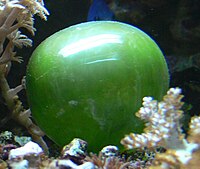
Photo from wikipedia
BACKGROUND Insects living in unfavorably high or low temperatures are predicted to display a fast or slow life-history strategy. Here, we examined life histories of fall armyworm (FAW), a globally… Click to show full abstract
BACKGROUND Insects living in unfavorably high or low temperatures are predicted to display a fast or slow life-history strategy. Here, we examined life histories of fall armyworm (FAW), a globally important invasive species with a broad ecological niche, at five constant temperatures including 13 °C, 19 °C, 25 °C, 31 °C and 37 °C, to study life-history responses to different temperatures. RESULTS In our experiment FAW had lower lifetime fecundity at unfavourable temperatures, a finding that is consistent with the idea that FAW can shift resources from reproduction to other functions under stressful conditions - such as heat or cold tolerance. Given adverse effects of stressful temperatures, life-history strategies arise from individuals having limited remaining resources to allocate towards vital functions like survival or reproduction. Here we show plasticity in life-history strategies adopted at different temperatures. Rather than simply varying along a fast-slow continuum, FAW at unfavorably high temperatures exhibited lower daily fecundity and longer reproductive lifespans and at unfavorably low temperatures showed a shorter peak in reproduction later in life, compared with ones at 25 °C. Such patterns, if adaptive, could suggest a strategy mitigating reproductive and mortality risk in unfavourable environments, however, this remains to be tested. CONCLUSION Our analysis suggests that the high invasion success of FAW may result from their ability to adjust life-history strategies, across a range of stressful temperatures, in a way that reduces not only mortality, but also fecundity loss. The adoption of such strategies may be instrumental for the global invasion success of FAW.
Journal Title: Pest management science
Year Published: 2022
Link to full text (if available)
Share on Social Media: Sign Up to like & get
recommendations!